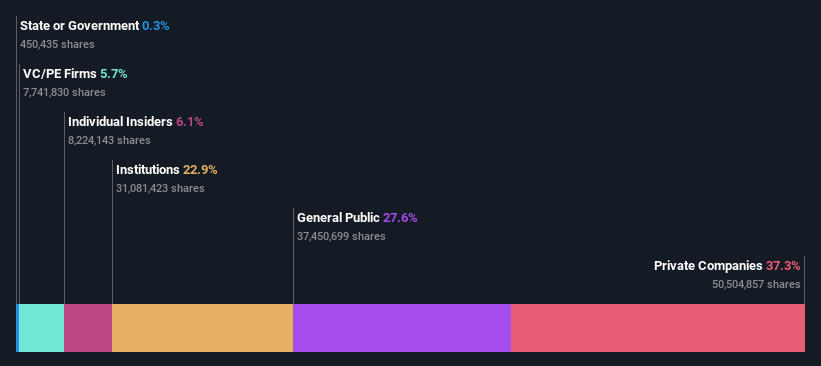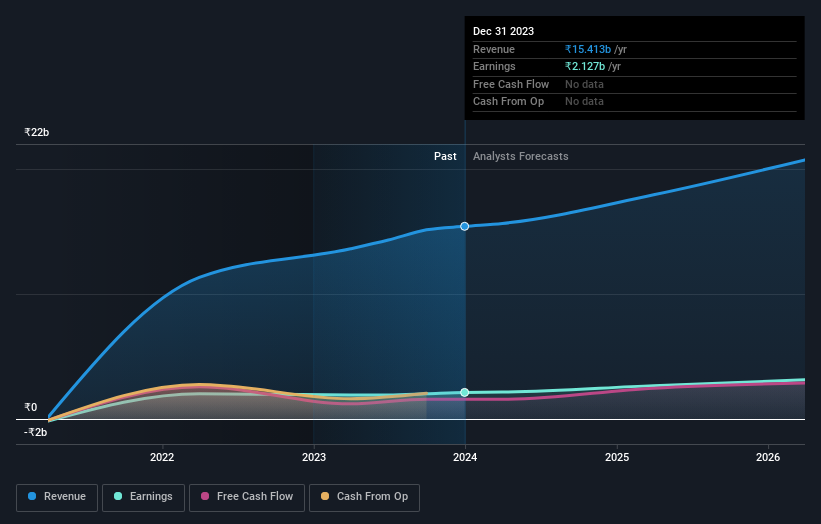Stock Analysis
- India
- /
- Consumer Services
- /
- NSEI:NIITMTS
NIIT Learning Systems Limited's (NSE:NIITMTS) last week's 7.9% decline must have disappointed private companies who have a significant stake

Key Insights
- Significant control over NIIT Learning Systems by private companies implies that the general public has more power to influence management and governance-related decisions
- The top 5 shareholders own 51% of the company
- Recent sales by insiders
Every investor in NIIT Learning Systems Limited (NSE:NIITMTS) should be aware of the most powerful shareholder groups. We can see that private companies own the lion's share in the company with 37% ownership. Put another way, the group faces the maximum upside potential (or downside risk).
As market cap fell to ₹64b last week, private companies would have faced the highest losses than any other shareholder groups of the company.
Let's delve deeper into each type of owner of NIIT Learning Systems, beginning with the chart below.
See our latest analysis for NIIT Learning Systems

What Does The Institutional Ownership Tell Us About NIIT Learning Systems?
Institutional investors commonly compare their own returns to the returns of a commonly followed index. So they generally do consider buying larger companies that are included in the relevant benchmark index.
NIIT Learning Systems already has institutions on the share registry. Indeed, they own a respectable stake in the company. This implies the analysts working for those institutions have looked at the stock and they like it. But just like anyone else, they could be wrong. It is not uncommon to see a big share price drop if two large institutional investors try to sell out of a stock at the same time. So it is worth checking the past earnings trajectory of NIIT Learning Systems, (below). Of course, keep in mind that there are other factors to consider, too.

We note that hedge funds don't have a meaningful investment in NIIT Learning Systems. The company's largest shareholder is Thadani Family Trust, with ownership of 17%. Pawar Family Trust is the second largest shareholder owning 17% of common stock, and Nippon Life India Asset Management Limited holds about 8.4% of the company stock.
Our research also brought to light the fact that roughly 51% of the company is controlled by the top 5 shareholders suggesting that these owners wield significant influence on the business.
While it makes sense to study institutional ownership data for a company, it also makes sense to study analyst sentiments to know which way the wind is blowing. There is a little analyst coverage of the stock, but not much. So there is room for it to gain more coverage.
Insider Ownership Of NIIT Learning Systems
The definition of company insiders can be subjective and does vary between jurisdictions. Our data reflects individual insiders, capturing board members at the very least. The company management answer to the board and the latter should represent the interests of shareholders. Notably, sometimes top-level managers are on the board themselves.
I generally consider insider ownership to be a good thing. However, on some occasions it makes it more difficult for other shareholders to hold the board accountable for decisions.
Our most recent data indicates that insiders own some shares in NIIT Learning Systems Limited. As individuals, the insiders collectively own ₹3.9b worth of the ₹64b company. Some would say this shows alignment of interests between shareholders and the board. But it might be worth checking if those insiders have been selling.
General Public Ownership
The general public, who are usually individual investors, hold a 28% stake in NIIT Learning Systems. This size of ownership, while considerable, may not be enough to change company policy if the decision is not in sync with other large shareholders.
Private Equity Ownership
With a stake of 5.7%, private equity firms could influence the NIIT Learning Systems board. Some might like this, because private equity are sometimes activists who hold management accountable. But other times, private equity is selling out, having taking the company public.
Private Company Ownership
It seems that Private Companies own 37%, of the NIIT Learning Systems stock. It might be worth looking deeper into this. If related parties, such as insiders, have an interest in one of these private companies, that should be disclosed in the annual report. Private companies may also have a strategic interest in the company.
Next Steps:
I find it very interesting to look at who exactly owns a company. But to truly gain insight, we need to consider other information, too. For instance, we've identified 2 warning signs for NIIT Learning Systems that you should be aware of.
If you would prefer discover what analysts are predicting in terms of future growth, do not miss this free report on analyst forecasts.
NB: Figures in this article are calculated using data from the last twelve months, which refer to the 12-month period ending on the last date of the month the financial statement is dated. This may not be consistent with full year annual report figures.
Valuation is complex, but we're helping make it simple.
Find out whether NIIT Learning Systems is potentially over or undervalued by checking out our comprehensive analysis, which includes fair value estimates, risks and warnings, dividends, insider transactions and financial health.
View the Free AnalysisHave feedback on this article? Concerned about the content? Get in touch with us directly. Alternatively, email editorial-team (at) simplywallst.com.
This article by Simply Wall St is general in nature. We provide commentary based on historical data and analyst forecasts only using an unbiased methodology and our articles are not intended to be financial advice. It does not constitute a recommendation to buy or sell any stock, and does not take account of your objectives, or your financial situation. We aim to bring you long-term focused analysis driven by fundamental data. Note that our analysis may not factor in the latest price-sensitive company announcements or qualitative material. Simply Wall St has no position in any stocks mentioned.
About NSEI:NIITMTS
NIIT Learning Systems
NIIT Learning Systems Limited, doing business as NIIT Managed Training Services, offers managed training services in North America, Europe, Asia, and Oceania.
Flawless balance sheet with reasonable growth potential.


